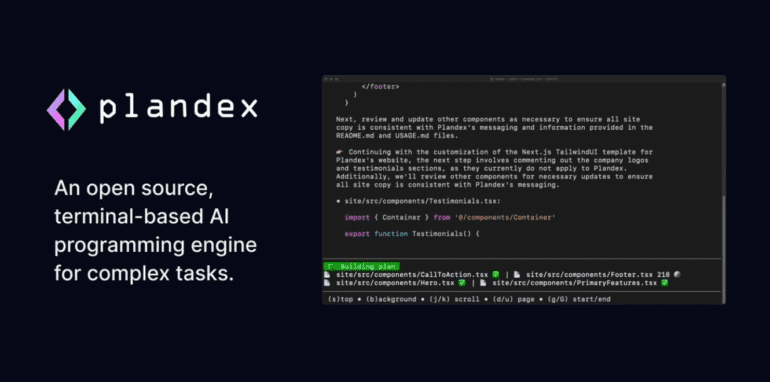- Plandex, an open-source terminal-based AI coding engine, aims to simplify complex software development.
- It automates routine coding tasks, allowing developers to focus on innovation.
- Utilizes long-running agents to break down large tasks efficiently.
- Integrates with OpenAI API with plans for compatibility with other models.
- Offers functionalities for building complex software, efficient context management, sandbox testing, and cross-platform compatibility.
Main AI News:
The landscape of software development is experiencing a rapid evolution, marked by the fusion of artificial intelligence (AI) with coding methodologies, promising to revolutionize developers’ workflows. Amidst this transformative wave stands Plandex, an innovative project poised to streamline the creation of intricate software solutions. Plandex, an open-source, terminal-based AI coding engine harnessing the power of OpenAI, marks a significant leap forward in coding efficiency and project management.
Plandex serves as a catalyst for automating repetitive coding tasks, liberating developers to focus on more creative and demanding endeavors. Conceived by a programmer weary of the tedium of code juggling between ChatGPT and other projects, Plandex stands out not only for its ability to tackle complex tasks spanning multiple files and stages but also for its unique approach to error handling and iterative coding processes.
Employing long-running agents adept at breaking down mammoth tasks into digestible subtasks, Plandex ensures the seamless execution of intricate operations, reshaping how developers address their workloads, explore emerging technologies, and surmount coding challenges.
A hallmark feature of Plandex lies in its seamless integration with the OpenAI API, mandating users to furnish their API keys. However, its roadmap envisages compatibility with other models such as Google’s Gemini and Anthropic’s Claude, alongside open-source models, hinting at a future where Plandex evolves into a more versatile and potent tool.
The Plandex initiative unfolds a suite of functionalities meticulously designed to enrich the coding journey:
- Empowering developers to craft sophisticated software functionalities beyond mere autocomplete.
- Facilitating efficient context management within the terminal, ensuring smooth updates of files and directories to keep AI models abreast of the latest project dynamics.
- Providing a sandbox environment for safely testing modifications prior to application, complete with integrated version control and branching capabilities for exploring diverse coding strategies.
- Offering cross-platform compatibility across Mac, Linux, FreeBSD, and Windows, functioning as a standalone binary sans dependencies.
Beyond its utility as a mere tool, Plandex emerges as a beacon of relief for developers grappling with the scourge of “copy-pasting madness” plaguing contemporary software development. By furnishing a platform where developers can experiment, iterate, and cherry-pick optimal approaches devoid of manual context wrangling, Plandex heralds a new epoch in software development.
Conclusion:
The emergence of Plandex signals a significant shift in software development methodologies, ushering in an era where AI integration becomes indispensable for coding efficiency. This advancement not only streamlines workflows but also empowers developers to explore new frontiers in software creation. As Plandex continues to evolve and expand its capabilities, the market can anticipate a paradigm shift towards AI-driven coding tools, redefining industry standards and fueling innovation.

